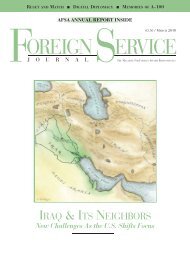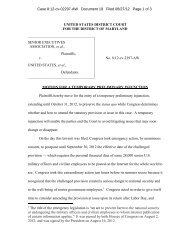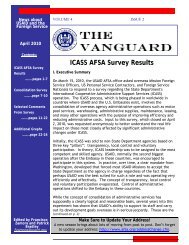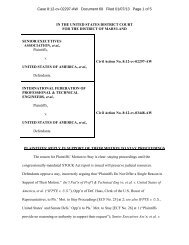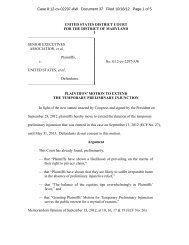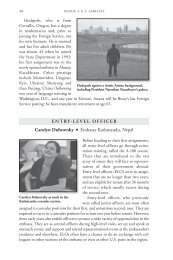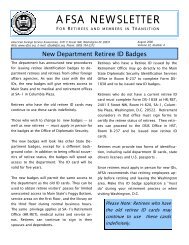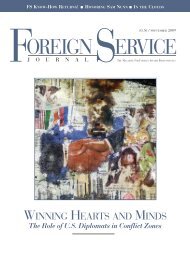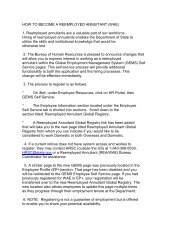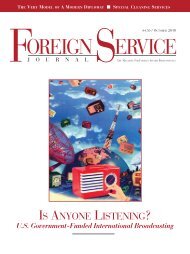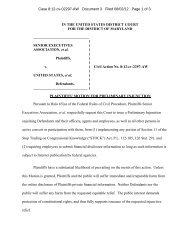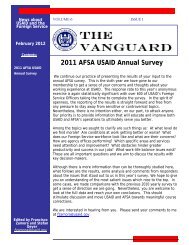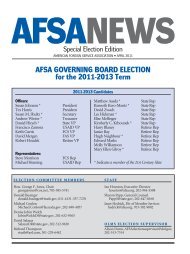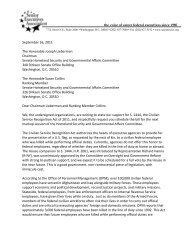F OCUS - American Foreign Service Association
F OCUS - American Foreign Service Association
F OCUS - American Foreign Service Association
Create successful ePaper yourself
Turn your PDF publications into a flip-book with our unique Google optimized e-Paper software.
After leaving the <strong>Foreign</strong> <strong>Service</strong>,<br />
Richmond’s skills continued to be in<br />
demand in the waning years of the<br />
Soviet Union. Richmond contributed<br />
to the Helsinki process and later<br />
joined the National Endowment for<br />
Democracy.<br />
I entered the <strong>Foreign</strong> <strong>Service</strong> as<br />
Yale Richmond was retiring, but while<br />
reading Practicing Public Diplomacy<br />
I felt I’d gotten to know him. His<br />
straightforward writing makes his<br />
humanity, humility and sense of<br />
humor almost tangible. If I ever write<br />
a memoir, I would like it to be as<br />
instructive and enjoyable as Yale<br />
Richmond’s.<br />
Gerald Loftus, a retired FSO living in<br />
Brussels, analyzes diplomatic issues<br />
on his Web site, http://Avuncular<br />
<strong>American</strong>.typepad.com/blog.<br />
Compare and<br />
Contrast<br />
Uneasy Neighbo(u)rs: Canada,<br />
the USA and the Dynamics of<br />
State, Industry and Culture<br />
David T. Jones and David Kilgour,<br />
Wiley, 2007, $27.95, hardcover,<br />
352 pages.<br />
REVIEWED BY STEPHEN W. BUCK<br />
Having preceded David Jones as<br />
political minister-counselor in Ottawa<br />
and introduced him to his Canadian<br />
co-author, David Kilgour, I volunteered<br />
with enthusiasm to review<br />
Uneasy Neighbo(u)rs, whose title<br />
aptly points to the often subtle similarities<br />
and differences between<br />
Canada and the United States.<br />
Jones and Kilgour, a longtime<br />
member of Parliament and deputy<br />
speaker of the House of Commons,<br />
have undertaken an ambitious and<br />
76 FOREIGN SERVICE JOURNAL/JULY-AUGUST 2008<br />
B OOKS<br />
<br />
difficult task: exploring how <strong>American</strong>s<br />
and Canadians differ on major<br />
social and political issues. They<br />
briefly outline some major differences<br />
between the two societies and how<br />
they view each other: “life, liberty and<br />
the pursuit of happiness” versus<br />
“peace, order and good government;”<br />
separation of powers in the U.S. vs.<br />
concentration of power in the hands<br />
of the prime minister; and <strong>American</strong><br />
unilateralism vs. Canadian multilateralism.<br />
As the authors put it: “<strong>American</strong>s<br />
are proud of what they are —<br />
<strong>American</strong>s; Canadians are proud of<br />
what they are not — <strong>American</strong>s!”<br />
Decrying the sorry state of<br />
Canada’s military, Kilgour makes an<br />
eloquent argument that it should at<br />
least develop the capability to support<br />
peacekeeping and related multilateral<br />
operations. The authors rightly point<br />
out that in situations such as Chad or<br />
Darfur, military capability is essential:<br />
“the key component is good weapons,<br />
not good words.” Still, many around<br />
the world would respond that after<br />
seven years of relentless wielding of<br />
the <strong>American</strong> big stick, speaking softly<br />
— and listening — are in order.<br />
The authors acknowledge the difficulty<br />
Ottawa has had dealing effectively<br />
with the Bush administration’s<br />
“either you’re for us or against us” attitude.<br />
Yet they seem to prefer<br />
Mexico’s relatively muted opposition<br />
to the invasion of Iraq over Canada’s<br />
“almost contemptuous commentary<br />
… that suggested not only that the<br />
United States was wrong in its judgments<br />
but that it had no right to take<br />
action without international sanction.”<br />
(At this point a review of how George<br />
H.W. Bush built international consensus<br />
in the run-up to the Persian Gulf<br />
War, as compared to his son’s<br />
approach 12 years later, might have<br />
been useful.)<br />
Somewhat surprisingly, Kilgour<br />
writes that the Canadian role on<br />
human rights has been “far from spotless,”<br />
citing Ottawa’s policy of “constructive<br />
engagement” with a range of<br />
deeply repressive regimes such as<br />
China, Sudan, Iran and Cuba, as if<br />
talking to such regimes somehow<br />
gives them the gold seal of approval. I<br />
raise this point as one of a number of<br />
examples where the authors may be<br />
more in agreement in their views than<br />
Canadians and <strong>American</strong>s are.<br />
An excellent final chapter (“Where<br />
Are We Going?”) summing up comparisons<br />
between the two neighbors<br />
did leave me wishing the authors had<br />
spent a bit more time on the complex<br />
question of national unity, as well as<br />
the environmental implications of<br />
extracting oil fom tar sands. (Canada<br />
has been touting tar sands as having<br />
the potential to increase oil production<br />
to five million barrels a day.)<br />
Throughout, the book would have<br />
benefited from a more robust Canadian<br />
perspective, particularly in supporting<br />
multilateralism and opposing<br />
unilateralism. Indeed, some readers<br />
may be put off by Jones’s many acerbic<br />
pronouncements, his reveling in<br />
John Bolton’s criticism of the United<br />
Nations and dismissal of Canadian<br />
criticism of the U.S. invasion of Iraq<br />
as indicative of anti-<strong>American</strong>ism and<br />
fear of the <strong>American</strong> “Goliath.”<br />
Still, there is a huge amount of<br />
thought-provoking material and much<br />
wisdom here — and not just for those<br />
who deal with, or are being posted to,<br />
Canada. (Kilgour’s description of the<br />
relative insignificance of a backbencher<br />
is particularly poignant and<br />
informative.) It is also highly useful<br />
for <strong>American</strong>s seeking to understand<br />
their own nation better, precisely<br />
because the contrast is between countries<br />
whose make-up is so similar. ■<br />
Stephen Buck, a <strong>Foreign</strong> <strong>Service</strong> officer<br />
from 1963 to 2002, is a member of<br />
the FSJ Editorial Board.



